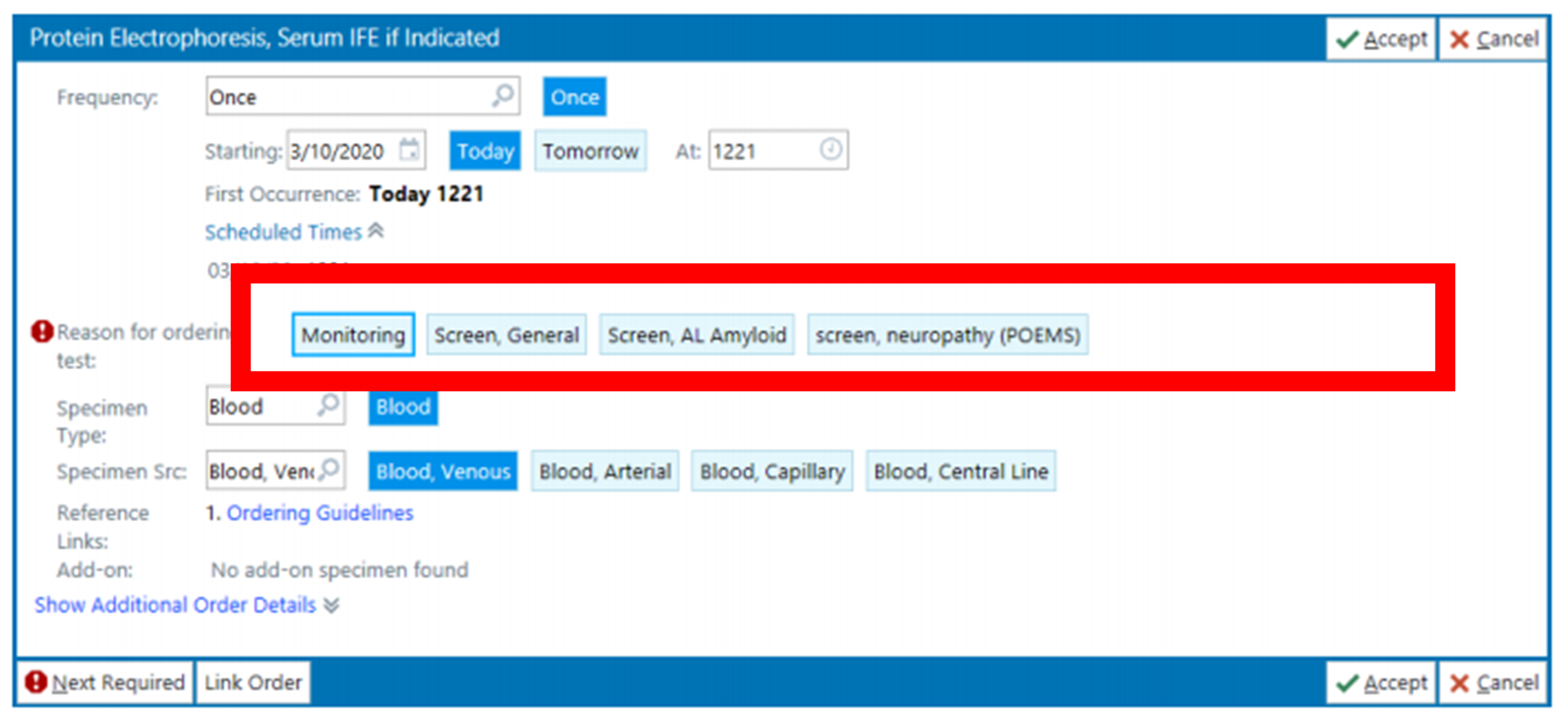Monoclonal gammopathies are characterized by the secretion of a monoclonal protein or M-protein. A wide variety of conditions can produce an M-protein, and the initial screening and monitoring of these patients require an array of tests. Herein we described best practices for protein electrophoresis ordering at Corewell Health.
The importance of serum free light chains (sFLC) test:
Serum protein electrophoresis (SPEP) has been the traditional test for M-protein detection, however, SPEP is limited in the detection of monoclonal free lights chains, which are the sole product in 15-20% of multiple myeloma patients. Guidelines recommend the combination of SPEP plus sFLC in screening to increase detection sensitivity.
For initial screening it is recommended to order “Monoclonal Gammopathy Screen (LAB1230573)” which includes “Protein Electrophoresis, Serum, IFE if Indicated (LAB844)” and “Kappa and Lambda Free Light Chains (LAB3114)”. Any abnormalities in either the SPEP or sFLC will result in secondary testing, serum immunofixation (sIFE). To screen for M-proteins for all diagnoses except AL amyloidosis, the sFLC assay can replace “Protein Electrophoresis, 24-Hour Urine, do IFE if Indicated (LAB2111444)”, nevertheless, after diagnosis, a 24-hour urine study should be done. For AL amyloidosis screening, “Protein Electrophoresis, 24-Hour Urine, do IFE if Indicated (LAB2111444)” in addition to the “Monoclonal Gammopathy Screen (LAB1230573)” is recommended. A 24-hour urine sample is recommended, although if this is not possible a first morning void sample is encouraged. In addition to the important role sFLC plays in initial screening, this test is important for disease stratification and monitoring of disease including treatment response.
Reflexing of “Protein Electrophoresis, Serum, IFE if Indicated (LAB844)”, “Protein Electrophoresis, 24 Hour Urine, do IFE if Indicated (LAB2111444)”, and “Protein Electrophoresis, Random Urine, do IFE if Indicated (LAB2111445)” to secondary testing, IFE:
Our available orderables for protein electrophoresis include “do IFE if Indicated.” This means that IFE is a lab orderable only test and reflexing to IFE is based on specific situations. Indicators for reflexing include abnormalities in the protein electrophoresis, abnormal sFLC ratio, hypogammaglobulinemia, and in cases of low tumor burden disease such as neuropathy and AL amyloidosis.
For situations where neuropathy and AL amyloidosis are of clinical suspicion, SPEP, IFE, and sFLC are all recommended. Providers can facilitate the reflexing of cases of neuropathy and AL amyloidosis to IFE by answering the order question, “reason for ordering test” (Figure 1). By answering the question as “screen, AL Amyloid” or “screen, Neuropath (POEMS),” the lab will reflex to IFE even if the protein electrophoresis is apparently normal. “Protein Electrophoresis, 24-Hour Urine, do IFE if Indicated (LAB2111444)” and “Protein Electrophoresis, Random Urine, do IFE if Indicated (LAB2111445)” is only indicated for AL amyloidosis, therefore, the answer for reason for ordering does not include neuropathy.
Recommendations for monitoring:
In the monitoring of patients positive for a M-protein the following tests are recommended. In addition, it is advised that patients are tested at a single laboratory. Different institutions have different electrophoresis methodologies and quantitation practices and reported results may differ between institutions leading to provider confusion.
1. If the patient has a serum and urine M-protein, then “Protein Electrophoresis, Serum, IFE if Indicated (LAB844)”, “Protein Electrophoresis, 24-Hour Urine, do IFE if Indicated (LAB2111444)”, and “Kappa and Lambda Free Light Chains (LAB3114)” are recommended.
It is recommended to order a 24-hour urine study as the random urine study is unable to report a M-protein concentration. If the patient has a detectable M-protein in the serum only then “Protein Electrophoresis, Serum, IFE if Indicated (LAB844)” and “Kappa and Lambda Free Light Chains (LAB3114)” are recommended. Only if the patient has a detectable M-protein in the urine should “Protein Electrophoresis, 24-Hour Urine, do IFE if Indicated (LAB2111444)” and “Kappa and Lambda Free Light Chains (LAB3114)” be recommended.
2. Total immunoglobulin, “IgG, Blood Level (LAB71)”, “IgM, Blood Level (LAB72)”, and “IgA, Serum/Plasma (LAB73)” should be followed. This is especially important for M-proteins that do not migrate in the gamma globulin region and are unquantifiable. The concentration of the M-protein can be followed using the involved immunoglobin concentration.

Figure 1. Order questions for “Protein Electrophoresis, Serum, IFE if Indicated” to indicate reason for ordering.
References:
- Keren DF, et al. Laboratory Detection and Initial Diagnosis of Monoclonal Gammopathies: Guideline From the College of American Pathologists in Collaboration With the American Association for Clinical Chemistry and the American Society for Clinical Pathology. Arch Pathol Lab Med. 2021. 0.5858/arpa.2020-0794-CP.
- Rajkumar SV, et al. International Myeloma Working Group updated criteria for the diagnosis of multiple myeloma. The Lancet. Oncology 2014;15:e538-48.
- Kumar S, et al. International Myeloma Working Group consensus criteria for response and minimal residual disease assessment in multiple myeloma. Lancet Oncol. 2016 Aug;17(8):e328-e346.
